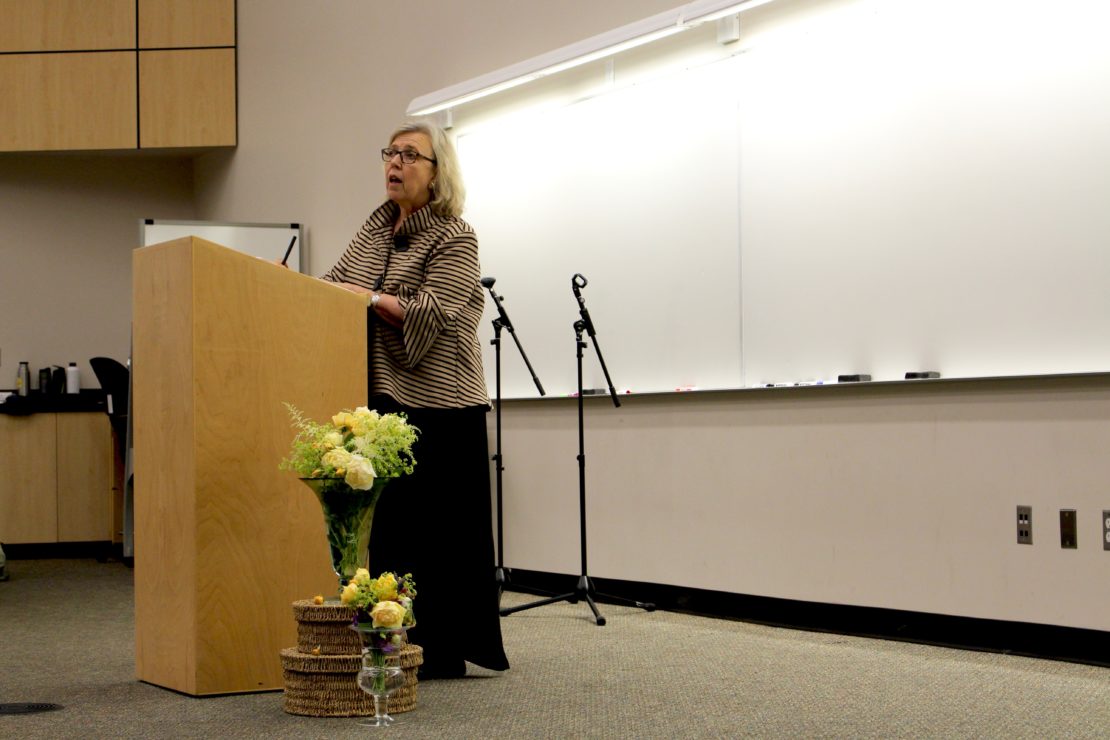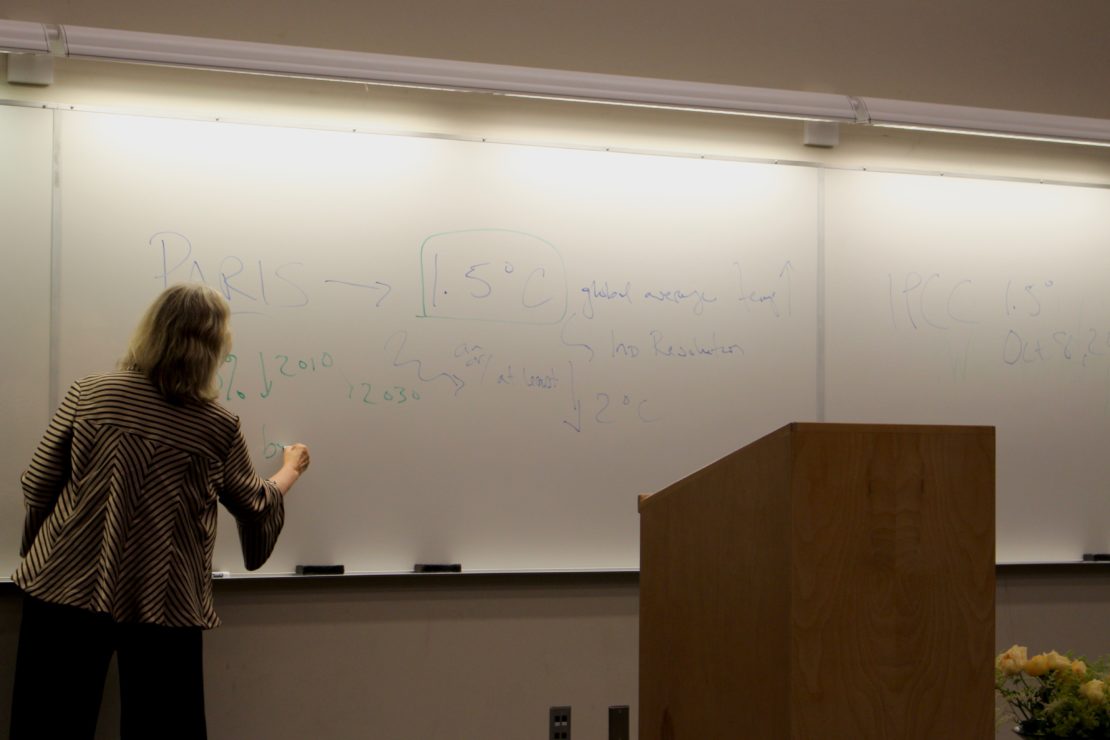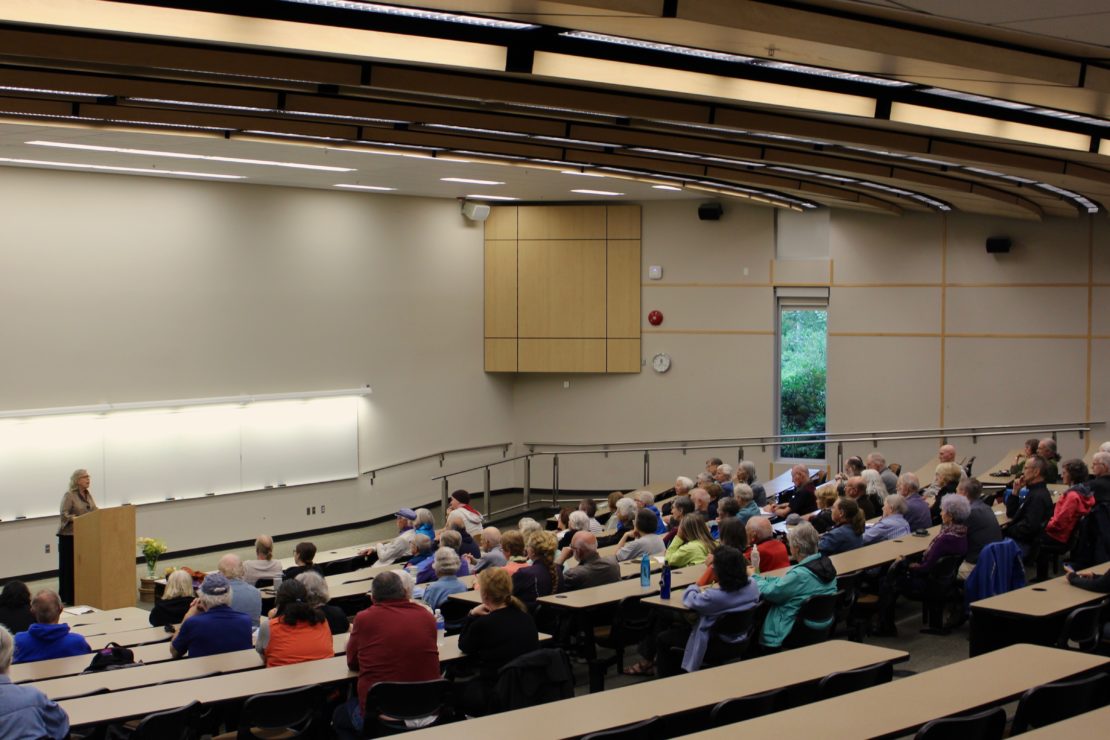May answered constituents’ questions about recent parliamentary session, taught a mini-lecture on the Paris targets

Just one week after the parliamentary session ended, the federal Green Party leader and Saanich-Gulf Islands Member of Parliament Elizabeth May was back in her home riding to speak with constituents at UVic’s Bob Wright Building.
She started off on June 26 by emphasizing that the meeting was nonpartisan; she was there as an MP to update constituents on recent developments in Parliament.
In a 20-minute speech, May went through a list of bills she felt were positive from the last few months in Ottawa. Afterwards, guests in the audience were welcomed to ask questions.
There were about 70 people in attendance — most of them were older, and many of them May knew by name. Despite the fact that the event was held at the university, there were no UVic students in attendance.
Her speech started with a logistical update on the new seating arrangement in the House of Commons, as she now sits beside former Liberal MPs Jody Wilson Raybould and Jane Philpott instead of the People’s Party of Canada leader Maxine Bernier.
“It’s a better neighbourhood,” May said.
She applauded bills that passed, including a bill to ban the keeping of whales in captivity, and bill C-48 which bans oil tankers with more than 12 500 metric tons of oil from passing through Hecate Strait near Haida Gwaii.
May expressed her disappointment with some bills she felt were unfairly held up and killed by the Senate. For instance, she called the former Conservative leader Rona Ambrose ‘a dear friend’, and expressed her disappointment that Ambrose’s mandatory sexual assault training bill did not pass. The bill would’ve required federally appointed judges to take training on sexual assault.
Another bill that May was disheartened to see not pass was the bill recognizing the United Nations Declaration on the Rights of Indigenous Peoples — which will now not be passed since parliament is no longer in session.
With an election around the corner, May will now focus on campaigning. This is one of many nonpartisan town halls she has hosted to update her constituents on parliamentary proceedings since the last election.
May answered questions from the audience for the majority of the town hall. The questions touched on a variety of issues, including undocumented immigration, money laundering, and, of course, climate change. At one point in the event, May took to the whiteboard to explain her frustration with the Paris targets.
In all caps, she wrote “PARIS” and proceeded to explain the misinformation surrounding the accord.

At the Paris conference, world leaders agreed that the global average temperature could not rise beyond one and a half degrees celsius beyond pre-industrial levels, without seeing catastrophic effects. Right now, we are at one degree. In advance of the Paris conference, former Prime Minister Stephen Harper proposed to lower Greenhouse Gas emissions by 30 per cent below 2005 levels by 2030.
Now, this emissions goal is being cited as the Paris Target by the current Trudeau government. This target, May said, is insufficient to actually meet the Paris goal. Those who signed the agreement in Paris agreed that going above that 1.5 degrees would be detrimental to the planet — and May argued the emissions target Trudeau and her other colleagues in parliament are aiming for does not go far enough.
May joked that she wished the leader’s debate allowed her to write on a whiteboard, so she could educate voters about this distinction between the actual Paris Agreement and Trudeau’s goals. She stepped away from the board to answer the next question, leaving percentages and arrows sprawled across three whiteboards.

One of the last questions asked the room to take a moment of silence for those in India dying due to extreme heat, to which no one had any objections. The room fell silent, until May walked back to the whiteboard and wrote, again in all caps, “GRETA THUNBERG.”
Thunberg is a young climate activist, and an example of “principled leadership,” according to May.
Thunberg is organizing a Global Climate Strike from September 20-27. The strike corresponds with the UN Climate Change Summit between world leaders in New York on September 23.
May encouraged the crowd to join her in the Canadian Global Climate Strike on September 27.
In closing, in reference to the ongoing battle with climate change, May said, “We have no reason to fail other than cowardice, comfort . . . what we have to do is close to impossible, but it is possible.”







